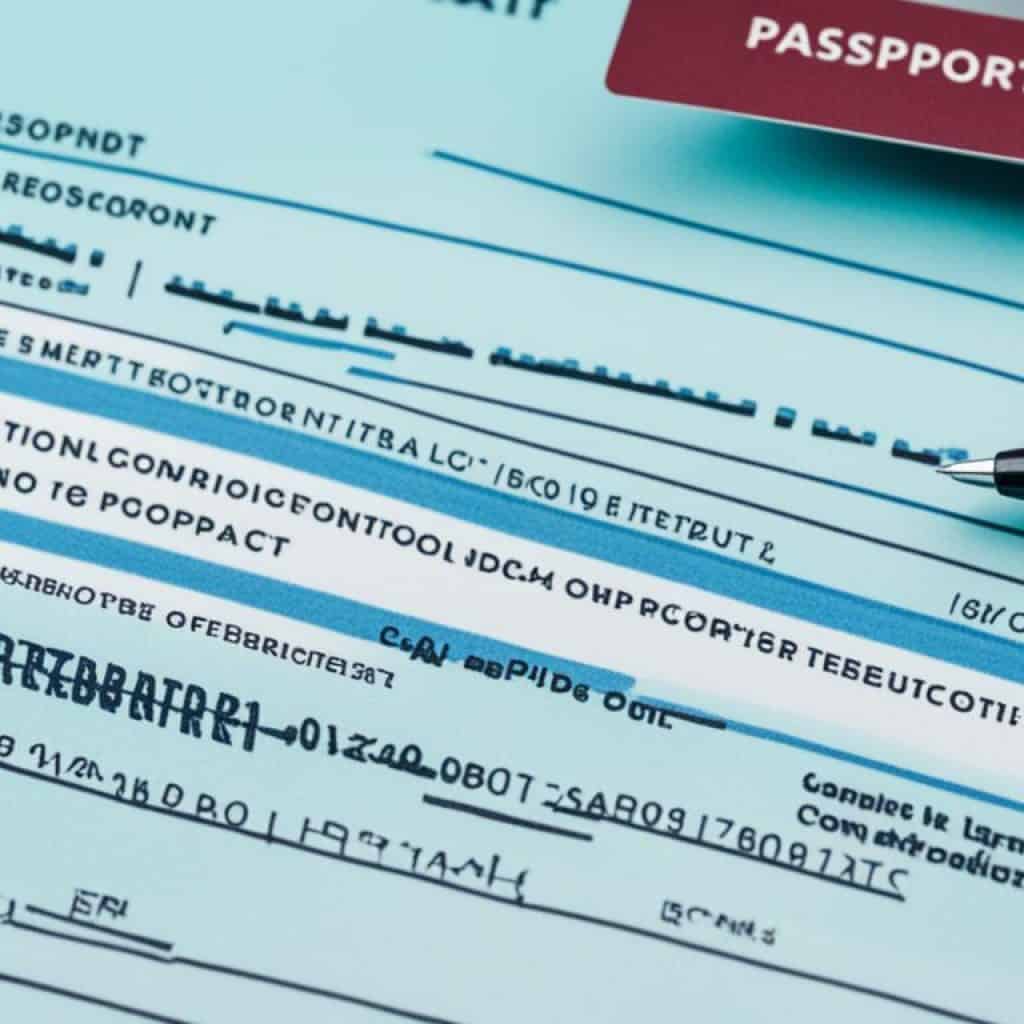Are you an American citizen living abroad? Have you been struggling to understand the complexities of US expat taxes? Don’t worry, you’re not alone. The world of expat taxes can be daunting, but there are simple solutions and expert tips to help you navigate the process with ease and confidence.
From tax preparation and filing to IRS tax regulations and the role of US expat tax consultants, this article will provide you with the guidance you need to ensure you meet your tax obligations and minimize your tax liabilities. So, are you ready to take control of your US expat taxes and make the most of your financial situation?
Key Takeaways:
- Understanding US expat tax requirements is crucial for American citizens living abroad.
- US expats may still need to file US tax returns, regardless of their residency status.
- Reporting foreign source income and foreign account holdings is essential to avoid penalties.
- Tax treaties and tax benefits can help US expats minimize their tax liabilities.
- Seeking expert tax services can simplify the expat tax process and ensure compliance.
Do US Expats Need to File US Tax Returns?
US expats, including US citizens living abroad, are required to file US tax returns if they meet certain income thresholds. The US taxes its citizens on their worldwide income, regardless of where they live. This means that even expats who have never lived in the US or held an American passport may still be subject to US taxes.
The minimum income thresholds for filing US tax returns vary depending on filing status, with higher thresholds for married couples filing jointly. It is important for US expats to understand these tax filing requirements to avoid penalties and stay compliant with IRS regulations.
“US expats must fulfill their tax obligations to avoid penalties and ensure compliance.”
To determine if you need to file a US tax return as an expat, you should consider your worldwide income, filing status, and any applicable exemptions or credits. It is essential to review the IRS guidelines and consult with a qualified tax advisor to ensure accurate tax filing.
Filing US Tax Returns for Expats: Key Considerations
- Understand the income thresholds for your filing status
- Include worldwide income in your tax return
- Consider available exemptions and credits
- Stay updated on IRS regulations and deadlines
- Consult with a tax advisor for expert guidance
By staying informed and taking the necessary steps, US expats can fulfill their tax obligations and navigate the US tax filing process with confidence.
| Income Threshold | Single Filing Status | Married Filing Jointly |
|---|---|---|
| $12,400 | $24,800 | $27,400 |
| $25,100 (65 or older) | $27,000 (65 or older) | $32,000 (65 or older) |
Understanding Expat Tax Obligations
As a US expat, it is important to have a clear understanding of your tax obligations to ensure compliance with IRS regulations. One key consideration is double taxation, which refers to the potential for being taxed on the same income by both the US and your country of residence. To avoid double taxation, you may need to claim exemptions or credits.
Additionally, as a US expat, you are required to report foreign-registered businesses, foreign bank accounts, foreign investments, and other foreign assets. This includes reporting the income earned from these sources as well as any associated financial accounts.
“Understanding your expat tax obligations is crucial for US citizens living abroad to ensure compliance with IRS regulations.”
To report your foreign assets, you may need to complete specific forms such as the Foreign Bank Account Report (FBAR) and the Foreign Account Tax Compliance Act (FATCA). These forms provide the IRS with information about your foreign financial holdings to ensure transparency and compliance.
By understanding and fulfilling your expat tax obligations, you can avoid penalties and maintain compliance with the IRS. To help you visualize these obligations, here is a table summarizing the key reporting requirements:
| Expatriate Tax Obligations | Reporting Forms |
|---|---|
| Report foreign-registered businesses | Form 5471 |
| Report foreign bank accounts | FBAR (FinCEN Form 114) |
| Report foreign investments | Form 8938 |
| Report other foreign assets | Form 8938 |
Remember, ensuring compliance with your expat tax obligations is essential not only to avoid potential penalties but also to maintain a strong financial standing while living abroad. Consult with a tax professional or utilize online expat tax services to navigate these obligations smoothly and accurately.
Reporting Foreign Source Income
When it comes to filing US expat taxes, it’s not just about reporting worldwide income. US expats must also report any passive or unearned income they receive from foreign sources. This includes income from retirement plan payments, foreign rental properties, and even Social Security payments.
Accurately reporting all sources of income is crucial to ensure compliance with tax regulations. By doing so, US expats can avoid penalties and maintain a good standing with the IRS.
Passive or Unearned Income Examples:
To give you a better idea of what qualifies as passive or unearned income, here are some examples:
| Income Source | Examples |
|---|---|
| Retirement Plan Payments | Pension payments, annuities |
| Foreign Rental Properties | Rental income from properties located outside the US |
| Social Security Payments | Social Security benefits received while living abroad |
These are just a few examples of passive or unearned income that US expats may have to report. It’s important to consult with a tax professional or use expert tax services for US expats to ensure that all sources of income are correctly reported on your tax return.
“Reporting foreign source income accurately is crucial for US expats. By providing complete information to the IRS, you can avoid any potential penalties and maintain compliance with tax regulations.” – [Tax Professional Name], [Tax Firm Name]
Remember, reporting foreign income is an important aspect of US expat taxes. By staying on top of your reporting obligations, you can ensure that you meet the necessary requirements and maintain a smooth and hassle-free tax filing process.
Reporting Foreign Account Holdings
When it comes to your foreign financial accounts, reporting them accurately is essential to complying with IRS regulations. US taxpayers who have accumulated $10,000 or more across qualifying foreign accounts must file a Foreign Bank Account Report (FBAR) using IRS Form 114. This requirement applies to a range of financial accounts, including checking, savings, investment, and pension accounts.
It’s important to note that the FBAR filing requirement extends beyond individual accounts. If you have control or signatory authority over other foreign accounts, such as joint or business accounts, they must also be reported on the FBAR.
The filing deadline for FBARs is typically April 15th. However, for US expats, there is an automatic extension until October 15th, providing additional time to complete the necessary paperwork and report their foreign account holdings accurately.

By adhering to the filing deadline and ensuring proper reporting of your foreign account holdings, you are taking proactive steps towards fulfilling your tax obligations as a US taxpayer.
Understanding Foreign Business Reporting
US expats with foreign business interests may have additional reporting requirements. It is important for US expats to understand these reporting requirements to ensure compliance with IRS regulations.
Foreign-Registered Corporations
Foreign-registered corporations owned by Americans must be reported on Form 5471. This form provides detailed information about the corporation’s ownership, financials, and activities. Reporting foreign-registered corporations allows the IRS to monitor the flow of funds and prevent tax evasion.
Foreign-Registered Partnerships
Foreign-registered partnerships should be reported on Form 8865. Partnerships, including joint ventures and limited partnerships, require US expats to disclose their ownership interest, income generated, and other relevant information. Reporting foreign-registered partnerships is essential for transparency and accurate assessment of tax liabilities.
Foreign-Registered LLCs
Foreign-registered LLCs may require filing of Form 8832 initially, followed by reporting on Form 8858. Form 8832 is used to classify an LLC for tax purposes, while Form 8858 collects information about the LLC’s ownership, income, and operations. Reporting foreign-registered LLCs ensures proper tax treatment and compliance with IRS regulations.
Understanding the reporting requirements for foreign-registered corporations, partnerships, and LLCs is crucial for US expats to fulfill their tax obligations and avoid penalties. By accurately reporting their foreign business interests, US expats can demonstrate transparency and compliance with IRS regulations.
| Reporting Requirement | Form |
|---|---|
| Foreign-Registered Corporations | Form 5471 |
| Foreign-Registered Partnerships | Form 8865 |
| Foreign-Registered LLCs | Form 8832, Form 8858 |
State Tax Obligations for US Expats
While living abroad, US expats may still have state tax obligations to consider. These obligations can vary depending on their ties to a specific state, such as property ownership, investments, voter registration, or dependents. It’s essential for US expats to understand their specific state tax obligations, including the rates and requirements imposed by each state. Some states may require expats to continue filing tax returns unless they establish residency in another state or demonstrate that they will never return.
Retaining ties to a state, even while living abroad, can trigger state tax filing requirements. Expats need to evaluate their connections to determine if they have ongoing tax obligations to their previous state of residency. Common ties include:
- Property Ownership: If an expat continues to own property in a specific state, they may still be subject to state taxes on that property.
- Investments: Income generated from investments located in a specific state may still be subject to state taxes.
- Voter Registration: Maintaining voter registration in a state can signify ongoing ties to that state and potentially trigger state tax filing requirements.
- Dependents: If an expat has dependents still residing in a specific state, they may need to continue filing state tax returns. This could include providing financial support for dependents’ education, healthcare, or other needs.
It is important for US expats to be aware of their state tax obligations and consult with tax professionals to ensure compliance. Failing to meet state tax filing requirements could result in penalties and other legal consequences.
To get a better understanding of the different state tax rates and requirements, refer to the table below:
| State | Tax Rate | Filing Requirements |
|---|---|---|
| New York | 4% – 8.82% | Income over $4,000 for single filers and $8,000 for joint filers |
| California | 1% – 13.3% | Income over $16,322 for single filers and $32,644 for joint filers |
| Texas | No state income tax | N/A |
| Florida | No state income tax | N/A |
These rates and requirements are subject to change, so it’s important to stay updated on the specific state tax obligations for US expats.
Understanding Tax Treaties and Foreign Taxes
The US has tax treaties in place with many countries to prevent double taxation for US citizens living abroad. These tax treaties provide important benefits for expats and help minimize their tax burden.
Tax Treaties and Double Taxation
In the context of international taxation, double taxation refers to the situation where the same income is taxed by two or more countries. It can lead to higher tax liabilities and financial burdens for individuals and businesses. Tax treaties are designed to resolve this issue by allocating taxing rights and providing relief from double taxation.
âTax treaties play a vital role in preventing double taxation for US expats, ensuring that they are not taxed twice on the same income,â says John Smith, a tax expert at XYZ Tax Consulting.
US Tax Treaties and Tax Benefits for Expats
The United States has tax treaties with many countries, including popular expat destinations. These tax treaties often include provisions that allow US expats to offset their US taxes with taxes paid to their country of residence.
Foreign Earned Income Exclusion (FEIE)
One significant tax benefit for US expats is the Foreign Earned Income Exclusion (FEIE), which allows eligible expats to exclude a certain amount of earned income from their US tax return. The FEIE helps reduce the US tax liability for expats living and working abroad.
Foreign Tax Credit (FTC)
The Foreign Tax Credit (FTC) is another important tax benefit for US expats. The FTC allows expats to claim a credit for taxes paid to their country of residence, offsetting their US tax liability. This credit is particularly beneficial when the foreign tax rate is higher than the US tax rate.
Maximizing Tax Benefits for US Expats
Understanding the provisions of tax treaties and the benefits available is crucial for US expats to minimize their tax burden. Expats should consult with a tax advisor familiar with US tax treaties to make the most of these tax benefits.
| Tax Treaty | Country | Provisions |
|---|---|---|
| US-UK Tax Treaty | United Kingdom | Provides relief from double taxation and allows tax credits to be claimed. |
| US-Canada Tax Treaty | Canada | Prevents double taxation and allows for the elimination of certain withholding taxes. |
| US-Australia Tax Treaty | Australia | Addresses double taxation and provides relief for pensions and superannuation. |
By leveraging the provisions of tax treaties and understanding the available tax benefits, US expats can significantly reduce their tax liabilities and ensure compliance with both US and foreign tax laws.
Next, we will explore in detail the Foreign Earned Income Exclusion (FEIE) and how it can benefit US expats.
The Foreign Earned Income Exclusion (FEIE)
As a US expat, you may be eligible for the Foreign Earned Income Exclusion (FEIE), which allows you to exclude a certain amount of your foreign earned income from US taxes. The FEIE is a valuable tax benefit that can significantly reduce your tax liability.
In order to qualify for the FEIE, you must meet either the Bona Fide Residence Test or the Physical Presence Test. The Bona Fide Residence Test requires you to establish residency in a foreign country for an uninterrupted period, demonstrating that you have a true attachment to that country. On the other hand, the Physical Presence Test requires you to be physically present in a foreign country for at least 330 days within a 12-month period.
The FEIE amount is subject to annual adjustments for inflation. For the tax year 2021, the maximum exclusion amount is $108,700. This means that you can exclude up to $108,700 of your foreign earned income from US taxes. However, it is important to note that the FEIE does not apply to other types of income, such as passive income, dividends, or capital gains.
To claim the FEIE, you must file IRS Form 2555 along with your annual tax return. This form requires you to provide details of your foreign earned income, as well as documentation to support your claim for the exclusion.
The Foreign Earned Income Exclusion (FEIE) allows US expats to exclude a certain amount of their foreign earned income from US taxes.
Claiming the FEIE can provide significant tax savings for US expats. It is important to consult with a tax professional or use a reputable tax service to ensure that you qualify for the exclusion and properly complete IRS Form 2555.
By taking advantage of the FEIE, you can reduce your US tax liability and keep more of your hard-earned income. Make sure to understand the qualifying tests, gather the necessary documentation, and file IRS Form 2555 accurately to enjoy the benefits of this valuable tax exclusion.
The Foreign Tax Credit (FTC)
The Foreign Tax Credit (FTC) is a valuable tool that allows US expats to reduce their US tax liability by offsetting taxes paid to foreign governments. As an expat, you can claim a dollar-for-dollar credit for foreign taxes paid on your expat income, helping you avoid double taxation and potentially lower your overall tax bill.
To qualify for the FTC, you must meet certain requirements:
- You must be a US citizen or resident alien
- You must have paid or accrued foreign taxes
- Your foreign income must be subject to both US and foreign income tax
- You must not claim the foreign earned income exclusion (FEIE) for the same income
Once you meet these criteria, you can claim the FTC by filing IRS Form 1116 along with your annual tax return. This form allows you to calculate the amount of the credit based on the foreign taxes paid and provide necessary supporting documentation.
It’s important to understand that the FTC is not a one-size-fits-all solution. The amount of the credit is limited to the lesser of the foreign taxes paid or the US tax on the same income. In some cases, you may not be able to fully utilize the FTC, especially if your foreign tax rate is lower than your US tax rate or if the income is exempt from US taxation.
Furthermore, the FTC can be complex to navigate, especially when dealing with multiple countries and different tax systems. Working with an experienced expat tax advisor can help ensure you maximize your eligibility for the FTC and accurately claim the credit on your tax return.
By understanding the FTC and how to qualify for it, you can take advantage of this valuable credit and potentially reduce your US tax liability. Consult with a tax professional to determine if you are eligible for the FTC and to ensure proper compliance with IRS regulations.
| Benefits of the Foreign Tax Credit (FTC) | Limitations of the Foreign Tax Credit (FTC) |
|---|---|
|
|
Choosing Between the FEIE and the FTC
When it comes to filing their taxes, US expats face an important decision: choosing between the Foreign Earned Income Exclusion (FEIE) and the Foreign Tax Credit (FTC). While both deductions offer benefits for reducing tax liabilities, the choice depends on several factors that US expats should consider to make an informed decision.
Income Type
One of the key factors to consider when choosing between the FEIE and the FTC is the type of income earned. The FEIE is ideal for excluding earned income from US taxes, such as wages or self-employment income. On the other hand, the FTC allows expats to offset taxes paid to foreign governments against their US tax liability, making it a suitable choice for those with unearned income, such as dividends, interest, or rental income.
Housing Expenses
Housing expenses can also play a role in the decision-making process. The FEIE allows expats to exclude a portion of their housing expenses, which can further reduce their tax liability. On the other hand, the FTC does not provide specific benefits for housing expenses.
Residency Status
Another crucial factor to consider is residency status. The FEIE is typically available to US expats who meet either the Bona Fide Residence Test or the Physical Presence Test. These tests determine an expat’s eligibility for the exclusion based on their residency duration and intention. Conversely, the FTC is not limited by residency status and can be claimed by any US taxpayer who has foreign taxes paid.
Future Plans
US expats should also take their future plans into account when choosing between the FEIE and the FTC. If an expat plans to return to the US and resume their tax obligations in the future, the FTC may be a more beneficial choice. It allows for carried-over tax credits, which can offset future US tax liabilities. However, if an expat intends to establish long-term residency abroad, the FEIE may provide greater tax savings.
Foreign Tax Liability
The amount of foreign tax liability is an essential factor to consider when making a decision. If an expat’s foreign tax liability is relatively low compared to their US tax liability, the FEIE may be more advantageous. Conversely, if an expat’s foreign tax liability exceeds their US tax liability, the FTC may provide more significant tax savings.
Ultimately, the choice between the FEIE and the FTC depends on an expat’s unique circumstances and financial situation. Considering factors such as income type, housing expenses, residency status, future plans, and foreign tax liability can help US expats make an informed decision that minimizes their tax liability and maximizes their financial benefits.
Avoiding Tax Penalties and Non-Compliance
As a US expat, it is crucial to understand the potential tax penalties and consequences that can arise from non-compliance with IRS regulations. Failure to meet tax filing requirements and non-compliance with reporting obligations can result in severe penalties that can significantly impact your finances.
Here are some important areas to keep in mind to avoid tax penalties and ensure compliance:
Filing Tax Returns
One of the most critical aspects of tax compliance is filing your tax returns accurately and on time. Failure to file your tax returns can lead to penalties that can quickly accumulate. Make sure to meet all filing deadlines and seek professional assistance if needed to ensure the accuracy and completeness of your tax returns.
Paying Taxes Owed
Along with filing your tax returns, it is essential to pay any taxes owed on time. Failure to pay taxes owed can result in penalties and potentially damage your credit rating. Be diligent in calculating and paying your tax liability accurately and promptly.
FBAR and FATCA Reporting
US expats with foreign financial accounts must comply with FBAR (Foreign Bank Account Report) and FATCA (Foreign Account Tax Compliance Act) reporting requirements. Failure to comply with these reporting obligations can lead to significant penalties. Make sure to understand the thresholds and timelines for reporting your foreign bank accounts and other foreign financial assets.
Streamlined Filing Compliance Procedures
If you have fallen behind on your US tax filings, the IRS offers a program called the Streamlined Filing Compliance Procedures. This program allows eligible US expats to catch up on their tax filing obligations without facing excessive penalties. Take advantage of this program to bring your tax affairs up to date and avoid potential penalties.
By taking the necessary steps to understand and comply with IRS regulations, you can avoid tax penalties and maintain compliance with US tax laws. Consult with a tax professional or expat tax advisor to ensure you meet all your tax obligations and stay on the right side of the IRS.

| Penalty | Consequence |
|---|---|
| Failure to file tax returns | Penalties based on the amount of tax owed can accumulate over time. |
| Failure to pay taxes owed | Additional penalties and interest on the unpaid tax amount. |
| Non-compliance with FBAR reporting | Potential penalties of up to $10,000 per unreported account. |
| Non-compliance with FATCA reporting | Possible penalties of up to $10,000 per unreported asset. |
Understanding these potential penalties and consequences is essential for US expats to maintain compliance with IRS regulations and avoid unnecessary financial setbacks. Stay informed, seek professional guidance, and ensure timely compliance to navigate the intricacies of expat tax obligations successfully.
Filing Deadlines and Extensions for US Expats
US expats have specific tax filing deadlines and options for extensions. Understanding these deadlines and extensions is crucial to avoid late filing penalties and stay compliant with IRS regulations.
The general deadline for filing US tax returns is April 15th. However, US citizens living abroad are granted an automatic extension until June 15th to file their taxes. It is important to note that if taxes are owed, the deadline for payment is still April 15th.
If US expats require more time to file their taxes beyond June 15th, they can request an additional extension until October 15th using Form 4868. This extension provides an extra six months to file tax returns.
To summarize:
General Tax Filing Deadline: April 15th
Automatic Extension for US Expats: June 15th
Deadline for Requesting Additional Extension: October 15th
Extension Form: Form 4868
By being aware of these expat tax deadlines and utilizing the available filing extensions, US expats can ensure timely and accurate filing of their tax returns.
US Expat Tax Filing Deadlines and Extensions
| Tax Filing Deadline | Automatic Extension Deadline | Deadline for Requesting Additional Extension | Extension Form |
|---|---|---|---|
| April 15th | June 15th | October 15th | Form 4868 |
Preventing Double Taxation with Tax Treaties
Tax treaties are critical to preventing double taxation for US expats and provide significant tax benefits. These agreements establish how income earned abroad should be taxed and offer provisions that can help US expats minimize their tax liabilities and avoid double taxation.
US expats who can benefit from specific tax treaty provisions must claim them on IRS Form 8833. By understanding the provisions and benefits outlined in tax treaties, US expats can ensure they are taking advantage of the opportunities to reduce their tax burden and avoid paying taxes on the same income to both the US and their country of residence.
Claiming tax treaty provisions on IRS Form 8833 is a straightforward process that requires careful attention to detail. US expats should consult with a qualified tax professional or utilize tax preparation services specifically designed for expats to ensure accurate and appropriate reporting.
Overall, tax treaties play a crucial role in simplifying the tax obligations of US expats and preventing the negative financial impact of double taxation. By utilizing the provisions outlined in these treaties, US expats can optimize their tax situations and achieve greater financial stability while living abroad.
Key Points:
- Tax treaties prevent double taxation for US expats.
- These agreements outline how income earned abroad should be taxed.
- Tax treaty provisions provide tax benefits for US expats.
- IRS Form 8833 must be used to claim tax treaty provisions.
- Understanding and utilizing tax treaty provisions can help US expats minimize tax liabilities and avoid double taxation.
Simplifying the Expat Tax Process
The process of filing US expat taxes can be complex and overwhelming. Therefore, it is recommended that US expats seek expert tax services to simplify the process and ensure accuracy.
H&R Block Expat Tax Services offers solutions for both DIY tax filing and filing with the assistance of tax advisors. These services can help US expats navigate the intricacies of expat taxes and maximize their deductions and credits.
With H&R Block Expat Tax Services, you can choose the method that best suits your needs. If you prefer a do-it-yourself approach, their online platform provides a user-friendly interface to guide you through the tax filing process step by step. You can access the platform from anywhere in the world, making it convenient for expats living abroad.
“H&R Block Expat Tax Services made filing my expat taxes a breeze. The online platform was easy to navigate, and I felt confident that I was filling out the forms correctly. I would highly recommend their services to any US expat.” – Sarah, US expat living in Singapore
If you prefer a more personalized approach, you can choose to file with a tax advisor from H&R Block Expat Tax Services. Their team of experienced tax professionals specializes in US expat taxes, ensuring that you receive expert guidance tailored to your unique situation. They can help you identify eligible deductions and credits, answer any questions you may have, and ensure that your tax return is accurate and compliant.
By utilizing H&R Block Expat Tax Services, you can simplify the expat tax process and have confidence in the accuracy of your tax return. Their expertise and guidance can help you navigate the complexities of US expat taxes, allowing you to focus on enjoying your life abroad.

Whether you choose to file your expat taxes on your own or with the assistance of a tax advisor, H&R Block Expat Tax Services is here to help. Simplify your expat tax journey and ensure compliance with US tax regulations by utilizing their expert services.
Conclusion
Understanding and navigating US expat taxes can be complex and overwhelming, but there are simple solutions and expert tax tips available to make the process easier. As a US expat, it is crucial to stay compliant with IRS regulations and fulfill your tax filing requirements.
First and foremost, be sure to accurately report your worldwide income, including any passive or unearned income such as retirement plan payments, foreign rental properties, or Social Security payments. Additionally, it is important to report your foreign account holdings, including qualifying financial accounts, to ensure compliance with FBAR reporting requirements.
Take advantage of tax treaties between the US and your country of residence to prevent double taxation and minimize your tax liabilities. Consider utilizing the Foreign Earned Income Exclusion (FEIE) or the Foreign Tax Credit (FTC) to further reduce your tax burden. Consulting with expert tax services, such as H&R Block Expat Tax Services, can also simplify the expat tax process and ensure accuracy.
By staying informed, meeting your tax obligations, and seeking professional guidance when needed, you can navigate the complex world of US expat taxes with confidence and ease.
FAQ
Do US Expats Need to File US Tax Returns?
Yes, US expats, including US citizens living abroad, are required to file US tax returns if they meet certain income thresholds. The US taxes its citizens on their worldwide income, regardless of where they live.
What Are the Expat Tax Obligations?
US expats have unique tax obligations, including the need to avoid double taxation and report foreign-registered businesses, foreign bank accounts, foreign investments, and other foreign assets.
What is Considered Foreign Source Income?
Foreign source income includes income from sources such as retirement plan payments, foreign rental properties, and Social Security payments.
How Do I Report Foreign Account Holdings?
US taxpayers who have accumulated $10,000 or more across qualifying foreign financial accounts must file a Foreign Bank Account Report (FBAR) using IRS Form 114. Qualifying financial accounts include checking, savings, investment, and pension accounts.
How Do I Report Foreign Business Interests?
Foreign-registered corporations owned by Americans must be reported on Form 5471. Foreign-registered partnerships should be reported on Form 8865. Foreign-registered LLCs may require filing of Form 8832 initially, followed by reporting on Form 8858.
Do US Expats Have State Tax Obligations?
US expats may still have state tax obligations depending on their ties to a specific state, such as property ownership, investments, voter registration, or dependents.
How Do Tax Treaties Benefit US Expats?
Tax treaties prevent double taxation for US citizens living abroad and often stipulate that expats can offset their US taxes with taxes paid to their country of residence.
What is the Foreign Earned Income Exclusion (FEIE) and How Do I Qualify?
The Foreign Earned Income Exclusion (FEIE) allows US expats to exclude a certain amount of their foreign earned income from US taxes. To qualify for the FEIE, expats must meet either the Bona Fide Residence Test or the Physical Presence Test.
What is the Foreign Tax Credit (FTC) and How Do I Claim It?
The Foreign Tax Credit (FTC) allows US expats to offset their US taxes with taxes paid to foreign governments. US expats who are eligible for the FTC must file IRS Form 1116 along with their annual tax return to claim the credit.
How Do I Choose Between the FEIE and the FTC?
The choice between the FEIE and the FTC depends on factors such as income type, housing expenses, residency status, future plans, and foreign tax liability.
What are the Penalties for Non-Compliance?
Non-compliance with US expat tax regulations can result in penalties for failure to file tax returns, failure to pay taxes owed, dishonored checks, and non-compliance with FBAR and FATCA reporting requirements.
What are the Filing Deadlines and Extensions for US Expats?
The general deadline for filing US tax returns is April 15th, but US citizens living abroad are granted an automatic extension until June 15th. US expats can also request additional extensions using Form 4868, extending the deadline to October 15th.
How Can I Avoid Double Taxation with Tax Treaties?
US expats can avoid double taxation by understanding the provisions of tax treaties and claiming them on IRS Form 8833.
How Can I Simplify the Expat Tax Process?
US expats can simplify the expat tax process by seeking expert tax services, such as H&R Block Expat Tax Services, which offer solutions for DIY tax filing and filing with the assistance of tax advisors.


















Add comment